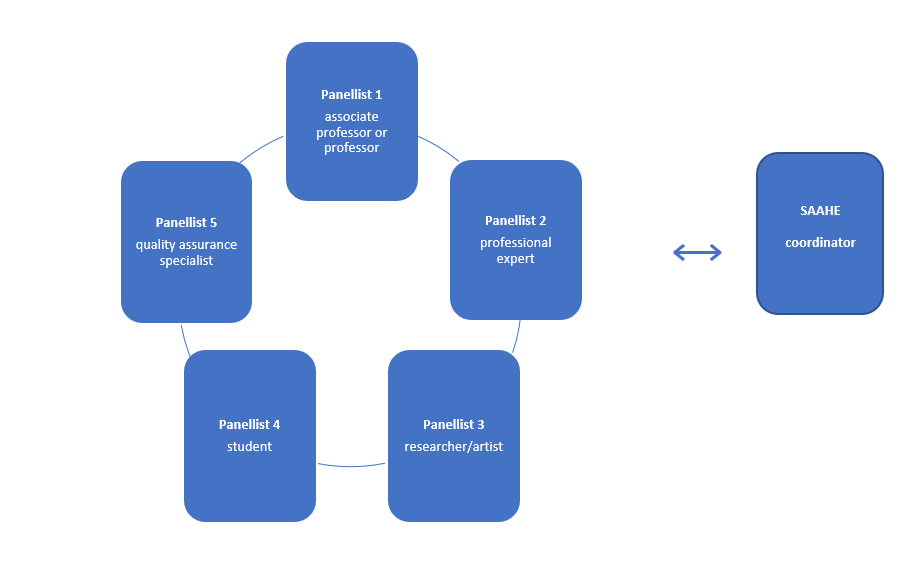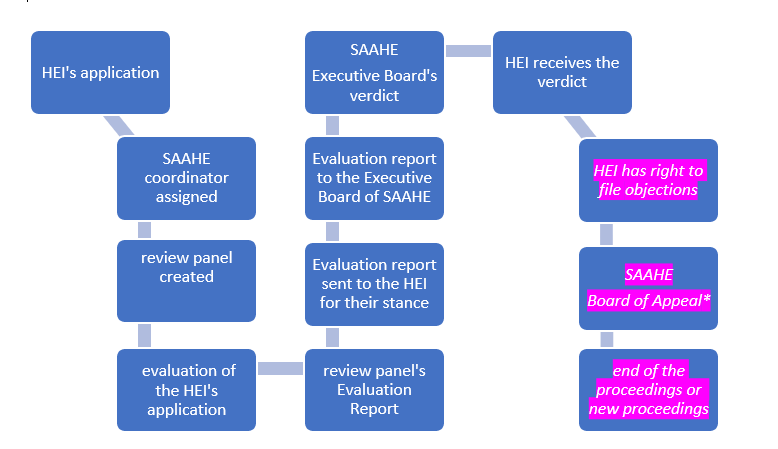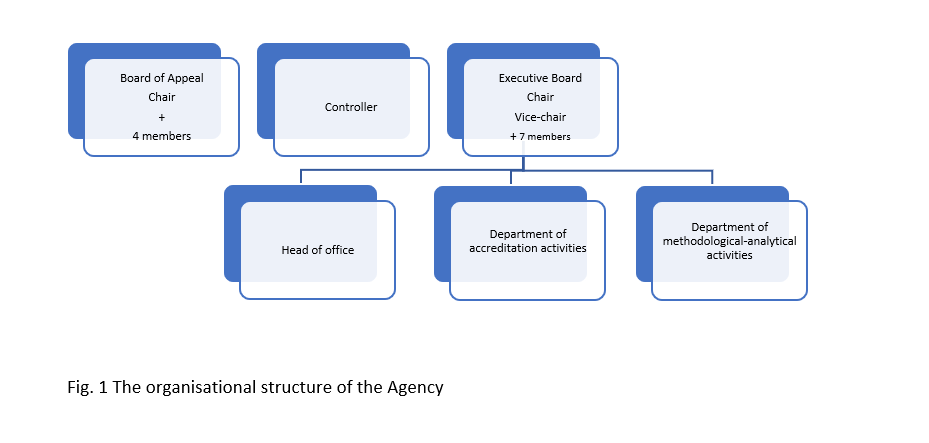Preamble by the Agency’s Chair

Ladies and Gentlemen,
Thank you very much for registering in the list of reviewers and your interest in working on a review panel of the Slovak Accreditation Agency for Higher Education (also the Agency or SAAHE).
The Agency regards the role of the review panels as crucial since accreditation decisions of the Executive Board are predominantly based on reviews by you, the panellists. Without well-functioning review panels and their evaluation reports, which reflect the expertise, professional outlook and objective approach of their members, the Agency could not possibly make quality decisions. Therefore, I consider it important that the Agency establishes a professional rapport with the reviewers and ensures regular communication with them. Part of this communication will include guidance.
To prepare you for the role of a panellist, the Agency has designed this Guidance material to provide you with adequate information on the Agency’s mission, the Slovak higher education system, the place of a review panel in proceedings and the necessary legislative framework for your work.
We greatly value your expertise, yourprofessional approach and experience in the evaluation of higher education institutions.
We look forward to our fruitful cooperation.
Introduction
Any major decision of the Slovak Accreditation Agency for Higher Education concerning accreditation proceedings relies heavily on review panels’ professional, objective, and thorough evaluation of higher education institutions. As a result, it is in the Agency’s interest to have at its disposal panellists whose professional experience, understanding of the Slovak higher education system and its quality assurance will ensure such evaluation. Consequently, the Agency has designed this Guidance material, which presents all the relevant information to help you perform your role in a professional and ethical manner.
Please note that the current internal regulations of the Agency require that a review panel candidate become acquainted with the Guidance material prior to their work on a review panel. Thus, we would very much appreciate your finding the time to go through it before your work as a panellist and give us brief feedback in the Feedback & Questions section.
Abbreviations
(the) Agency – the Slovak Accreditation Agency for Higher Education
ESG 2015 – the European Standards for Quality Assurance in Higher Education
HEI – a higher education institution
IS – Internal System (of quality assurance of a HEI)
RP – review panel
SAAHE – the Slovak Accreditation Agency for Higher Education
SP – study programme
Aims and outcomes
The role of a review panellist requires at least one of the following: in-depth knowledge of a specific field of study, extensive work experience, experience with quality assurance systems or being a student. Another requirement is an adequate understanding of the Slovak higher education system and its quality assurance.
This material aims to acquaint you with the specificities of the Slovak higher education system and its quality assurance. It will cover mainly:
- the Slovak Accreditation Agency for Higher Education,
- the Slovak higher education system,
- the work of review panels,
- types of proceedings.
As a result, you will be familiar with and understand the following:
- the Agency’s structure and its role in higher education quality assurance,
- the Slovak higher education system,
- the panellists’ selection process,
- the composition of review panels and their role in accreditation proceedings,
- the Rules of Procedure for the Review Panel,
- the Conflict of Interest Regulation,
- the Code of Ethics and Professional Conduct,
- types of proceedings the SAAHE deals with,
- the legislative framework for proceedings,
- step by step procedure for proceedings.
We believe the above-mentioned learning outcomes will help you towards a professional, objective, and thorough evaluation of Slovak higher education institutions.
The preparation for the role of a panellist takes the form of self-study. Besides information in written form and infographics, the material also includes hypertextual links to important legally binding documents and internal regulations of the Agency.
Slovak Accreditation Agency for Higher Education
The Slovak Accreditation Agency for Higher Education is a newly established public institution whose task is to perform external quality assurance activities in higher education institutions (HEI) primarily in Slovakia. It was established by Act No. 269/2018 Coll. (the Quality Assurance Act) as a legal entity based in Bratislava and started its work in 2019.
The main mission of the Agency is to contribute to the improvement of the quality of higher education following the European Standards for Quality Assurance in Higher Education (ESG 2015). The Agency provides a mirror of quality to higher education institutions and decides on the granting of accreditations following the law and the given Standards. The Agency replaced the role of the Accreditation Commission, an advisory body of the Government of the Slovak Republic in evaluating applications of higher education institutions, and it also takes over the decision-making authority of the Minister of Education, Science, Research and Sports of the Slovak Republic. The Agency is thus an independent, public institution that has autonomous decision-making powers in the field of external quality assurance in higher education.
As for its size, the Agency is a fairly small one employing altogether 20 people; all of them, however, are dedicated to their work and the mission of the Agency.
Slovak higher education system
To evaluate the quality of Slovak higher education institutions, a panellist needs to have an adequate understanding of the Slovak higher education system and its specificities. This section will give you a general overview of it.
A general prerequisite for admission to higher education studies is a school-leaving examination (maturitná skúška) taken at the end of secondary education.
Higher education in Slovakia provides study programmes at three levels:
- Bachelor’s study programme
- Master’s, Engineer’s and Doctor’s study programmes
- PhD. study programmes.
NB: There are a few joint study programmes such as general or veterinary medicine that join the first and second levels together.
Consequently, the higher education institutions in Slovakia award the following academic degrees:
- 1st level (National Qualifications Framework (NQF)/European Qualifications Framework (EQF) Level: 6)
– Bachelor “bakalár” (Bc.).
- 2nd level (NQF/EQF Level: 7)
– Master “magister” (Mgr.), in the field of the arts (Mgr. art.)
– Engineer “inžinier” (Ing.) in technical, agricultural and economic fields; in the field
of architecture and town-planning (Ing. arch.)
– Doctor of general medicine (MUDr.)
– Doctor of dental medicine (MDDr.)
– Doctor of veterinary medicine (MVDr.).
- 3rd level (NQF/EQF Level: 8)
– philosophiae doctor (PhD.)
– Doctor of Arts (ArtD.)
– licentiate in theology (ThLic.) 1st part of a PhD. study in the field of Catholic
Theology.
One of the local specificities of the higher education system is the so called Examina rigorosa. Holders of the academic degree of “magister” may take the examina rigorosa, which includes an exam and a defence of a rigorosa thesis. After its successful completion, higher education institutions award academic degrees such as: RNDr., PharmDr., PhDr., JUDr., PaedDr. and ThDr. Accreditation for this kind of degree programme will not be a subject of your evaluation.
The higher education system is based on the European Credit Transfer and Accumulation System (ECTS). The standard workload of a student studying in full-time form is 60 credits per academic year, 30 credits per semester and 20 credits per trimester.
At the end of a course, students are graded on their performance according to the following grading scale of A – Fx:
- A (excellent) = outstanding performance
- B (very good) = above average performance
- C (good) = average performance
- D (satisfactory) = acceptable performance
- E (sufficient) = performance fulfils only the minimum requirements
- Fx (unsatisfactory) = performance does not even fulfil the minimum requirements.
The academic year starts on September 1 and ends on August 31 of the following year. It is usually composed of two semesters (winter and summer) or of three trimesters. The organisation of the academic year is set by the statutes of the higher education institution or its faculty.
Higher education is provided in study programmes assigned to a field of study or a combination of fields of study. There are currently 7,244 accredited study programmes in 48 different fields of study.Theseinclude programmes for full-time and part-time studying, and language variants of the same programme.
The higher education system in Slovakia is regulated by the following Regulations and Acts:
- Act No. 131/2002 on Higher Education
- Act No. 269/2018 on Quality Assurance in Higher Education
- Decree No. 614/2002 on Credit System of Study
- Decree No. 244/2019 on Study Fields System in Slovak Republic
- Decree No. 246/2019 on Habilitation Proceedings and Inauguration Proceedings
Another specificity of the Slovak higher education system are habilitation proceedings and inauguration proceedings. Having obtained a 3rd level degree (PhD. or its equivalent), and having fulfilled the requirements for habilitation or inauguration proceedings, a scholar may apply first for a scientific-pedagogical title or artistic-pedagogical title of “associate professor” (“docent”) and later on for the title “professor”. The title of professor is the highest acknowledgment of expertise in a given field. This acknowledgment is confirmed by the fact that it is the president of the Slovak Republic who appoints them.
Please note that the Standards for Study Programmes allow HEIs to employ teaching staff in the position of associate professor or professor without the actual titles.
There are currently 34 higher education institutions in the Slovak republic, of which 20 are public, 3 are state and 11 are private. Besides these, there are also 4 foreign HEIs but they are not subject to the Agency’s evaluation. The list of the 34 HEIs can be found here.
Should you be interested in further information on the Slovak education system, please visit the websites of the Slovak Academic Information Agency or EURYDICE.
Creation of review panels and their work
Since review panels play a crucial role in the evaluation of HEIs, the Agency has a series of regulations concerning the panellists’ registration, creation of review panels, procedures of review panels, and their code of ethics.
Let us have a quick look at the most important articles of the regulations. When it comes to registration in a list of reviewers, a successful applicant may be registered if s/he meets at least one of the minimum requirements and is in the position of:
- professor or associate professor,
- researcher,
- artist,
- student,
- professional expert,
- quality assurance specialist.
On top of the minimum requirements, a candidate is also expected to have competencies, skills and experience that will guarantee a professional evaluation of a HEI’s research, artistic and other outputs in a relevant field of study, conducting research or evaluating research projects, being responsible for a study programme in a related field of study, etc.
Please also note that it may be some months between your registration and your actual work on a review panel. The Agency’s review panels are “tailor made” for proceedings and their composition depends on the one hand on the field of study in question, and on the other hand on the qualifications, experience, and competencies of the panellists. If you have not been selected for proceedings it will most likely imply that your profile has not yet met the particular requirements of particular proceedings.
For more information on the regulations, see them in full:
Rules of Procedure for the Review Panel
To ensure an objective evaluation of a HEI, panellists are expected to become familiar with the Conflict of Interest Regulation, and the Code of Ethics and Professional Conduct. The former document regulates the Agency’s measures to prevent conflicts of interest in reviewing and decision-making activities. It states the procedures for reviewing and handling conflicts of interest and the duties of the members of authorities, review panels, the Executive Board and the Agency employees upon the occurrence of a conflict of interest. The latter regulation ensures that the Agency authorities, review panel members, and the employees shall perform their tasks honestly, conscientiously, professionally and always in compliance with the highest ethical standards and moral principles while recognizing the fact that they are defending the public interest in ensuring the quality of HEIs.
Prior to their work in review panels, panellists submit a declaration of non- conflict of interest and undertake to abide by the Code of Ethics and Professional Conduct.
Conflict of Interest Regulation
Code of Ethics and Professional Conduct
A review panel usually consists of 5 panellists for full proceedings (e.g. accreditation of a new study programme) and of 3 panellists for partial proceedings (e.g. verification of changes to an existing study programme). See Figure 1 below.

Fig. 1: Composition of a typical review panel involving experts from different areas
Please note that different members of a review panel are expected to examine different aspects of a HEI. An associate professor or professor will, for example, focus more on the teaching staff of the HEI and their research, artistic and other outputs, whereas a student will look into the fulfilment of student-centred teaching and assessment, and into learning resources and support available to the HEI’s students. Consequently, different panellists will have a different degree of familiarity with particular standards. At the same time, however, it is important to remember that the evaluation is holistic, and any review panel member may have their say in any of the aspects evaluated.
Each review panel is assigned a coordinator from the Agency’s Department of Accreditation Activities. S/he is there to provide methodological, information and administrative support and to coordinate the work of the review panel.
The creation of a review panel and its procedure in proceedings also follows the Agency’s regulations. See the step-by-step graph below with the estimated time frame for each step. *Please note the time frame may vary depending on the type of proceedings.

Fig. 2: Procedure and estimated time frame of review panel creation and their work
Once the evaluation report is uploaded in the Information System and mailed to the Agency, the Executive Board can issue its verdict. The agency then informs the HEI and the public of the verdict.
As shown above, the RP and its evaluation report play a crucial role in the evaluation of Slovak HEIs. On the one hand, the role is demanding and requires a professional, objective and thorough approach. At the same time, it is rewarding in the sense that one has personally contributed to the quality assurance of a HEI.
Standards and other legislation
One of the main tasks of the Agency as a Slovak HEI quality assurance regulatory authority is to grant accreditations to HEIs. The Agency issues 3 types of accreditation:
- study programme accreditation
- internal quality assurance system (IS) accreditation
- habilitation proceedings and inauguration proceedings accreditation.
Full proceedings last up to 180 days and include a review panel’s site visit of the HEI (usually 2 days). During this visit the review panel has a unique opportunity to see the HEI and talk to its representatives, teaching staff, students etc. in person, and to request further proofs of the compliance of a study programme, etc. with the Law and the given Standards.
Figure 1 below shows the procedure for study programme accreditation proceedings from the moment a HEI sends its application, to the delivery of the SAAHE verdict to the HEI. Should the HEI raise objections, these are dealt with by the Board of Appeal.

*The Agency’s Board of Appeal examines the procedures of the Executive Board and review panels and checks whether all the binding regulations have been followed.
On top of these full proceedings there are partial proceedings which call for a 3-member review panel. They usually take 90 days to complete. The partial proceedings deal with HEI’s applications for a study programme modification, evaluation of corrective measures taken by the HEI or monitoring proceedings after a completion of a study cycle.
To some degree, the different types of accreditation proceedings share the same legislative framework. There are, however, variations as Table 1 below shows.
| Study Programme accreditation | Habilitation proceedings and inauguration proceedings accreditation | Internal quality assurance system accreditation | |
| ESG 2015 | ✓ | ✓ | |
| Act No. 269/2018 Coll on Quality Assurance of Higher Education | ✓ | ✓ | ✓ |
| Methodology for the Evaluation of Standards | ✓ | ✓ | ✓ |
| Standards for Study Programmes | ✓ | ✓ | |
| Standards for Habilitation and Inauguration Proceedings | ✓ | ||
| Standards for the Internal System | ✓ |
Depending on the type of proceedings for which you have been selected as a panellist, you will be expected to become familiar with the relevant standards and parts of the legal framework. Please see the hypertextual links to them below.
Act No. 269/2018 on Quality Assurance in Higher Education
The act covers the internal system of quality assurance in a higher education institution and its evaluation, the establishment and the standing of the Slovak Accreditation Agency for Higher Education and its activities, the accreditation of study programmes and the granting of accreditation for habilitation proceedings and inauguration proceedings.
The Act defines the internal system of quality assurance at a HEI, its aim, scope of influence, and the means. It determines rules for designing, approving, deliverying and modifying of a study programme.
The second part of the Act defines the procedures for individual proceedings the Agency deals with (internal system evaluation, granting accreditation for a study programme and granting accreditation for habilitation and inauguration proceedings).
Act No. 131/2002 on Higher Education
This is a general act concerning higher education in Slovakia, defining the role of HEIs, scope of their rights, organisational structure, internal regulations, financing, types of HEIs, study programmes, fields of study, studying at a HEI, final exams, students’ rights and duties, staff etc. A panellist is advised to look at Part Five defining The Field of Study, The Study Programme and The Study Plan: § 50 – § 54; Part Six focusing on the Studying at a HEI: § 55 – §68; Part Seven Students: § 69 – § 73; Part Eight Teaching Staff: §74 – § 80.
ESG 2015 Standards and Guidance for Quality Assurance in the European Higher Education
Area
The ESG should be considered in a broader context that also includes qualifications frameworks, ECTS credits and a diploma supplement that also contribute to promoting the transparency and mutual trust in higher education in the European Higher Education Area.
Methodology for the Evaluation of Standards
The Methodology is a set of procedures, criteria and indicators through which the Agency’s review panels, and the Agency’s staff evaluate compliance with the standards and measures. The document specifies:
- the procedures for evaluation
- criteria for evaluation
- indicators for evaluation
- the methodology for the evaluation of research, artistic and other activities.
Standards for Study Programmes
They are a set of requirements whose fulfilment is a condition for obtaining the accreditation of a study programme and for the Agency’s decision to authorise a higher education institution to design, deliver and modify study programmes in a given field and a level of study. The Standards for SP deal with the following:

Fig. 1 Standards for Study Programmes
Standards for the Internal System
The Standards are a set of requirements for the HEI’s internal quality assurance system. They require a HEI to adopt and apply quality assurance policies, and to have formalized policies, structures and processes for such quality assurance.
In terms of topics covered and their content, the Standards for the Higher Education Internal Quality Assurance System (IS) are analogous to the Standards for Study Programmes and they both draw from the ESG 2015. The main difference between the Standards for the IS and the Standards for SP is that the former apply to the institutional aspects of higher education quality assurance which formulates quality assurance criteria for the entire institution, whereas the latter apply to criteria for a given study programme. Once a HEI has its IS accredited by the Agency, the HEI can design, modify and deliver its own study programmes, the Agency no longer accredits the HEI’s study programmes.
Table 2 Relationship between the ESG 2015 and standards
| ESG 2015 | Standards for the Higher Education Internal Quality Assurance System | Standards for Study Programmes |
| 1.1 Policy for quality assurance | Article 2 Quality assurance policies | |
| 1.2 Design and approval of programmes | Article 3 Design, modification, and approval of study programmes | Article 2 Proposals and modifications |
| Article 3 Approval of study programmes | ||
| 1.3 Student-centred learning, teaching and assessment | Article 4 Student-centered learning, teaching, and assessment | Article 4 Student-centered learning, teaching, and assessment |
| 1.4 Student admission, progression, recognition and certification | Article 5 Student admission, progression, recognition and awarding of academic degrees | Article 5 Student admission, progression, recognition, and awarding of academic degrees |
| 1.5 Teaching staff | Article 6 Teaching staff | Article 6 Teaching staff |
| Article 7 Research, artistic and other activities of a higher education institution | ||
| 1.6 Learning resources and student support | Article 7 Learning resources and student support | Article 8 Learning resources and student support |
| 1.7 Information management | Article 8 Information management | Article 9 Information management |
| 1.8 Public information | Article 9 Public information | Article 10 Public information |
| 1.9 Ongoing monitoring and periodic review of programmes | Article 10 Ongoing monitoring and periodic review and approval of study programmes | Article 11 Ongoing monitoring and periodic review and approval of study programmes |
| 1.10 Cyclical external quality assurance | Article 11 Periodic external quality assurance |
Standards for Habilitation Proceedings and Inaguration Proceedings
The Standards for Habilitation and Inauguration Proceedings state the requirements for the evaluation of habilitation and inauguration proceedings of Slovak HEIs. The Standards define:
- the persons responsible for the proceedings;
- the level of research, artistic, and other activities of these persons;
- the criteria for reviewing the compliance of conditions for obtaining the titles of “associate professor” and “professor”;
- the rules and procedure for habilitation and inauguration proceedings.
Feedback and questions
Having gone through the Guidance material, please give brief feedback and your consent to personal data processing. Feedback
Your feedback is proof of your acquaintance with the guidance material, without which you cannot, unfortunately, be selected to work on a review panel.
Should you have any queries, please do not hesitate to contact us by e-mail (info@saavs.sk) or by telephone (+421 948 984 963). We will be happy to assist.
You can access the Agency’s latest news and updates through its website.
Thank you very much for your time, effort and cooperation.
We look forward to working with you.
Slovak Accreditation Agency for Higher Education


